教科版Book 4 Unit 2 Grammar (11PPT)
合集下载
人教版Book 4 unit 2 Grammar(共28张PPT)
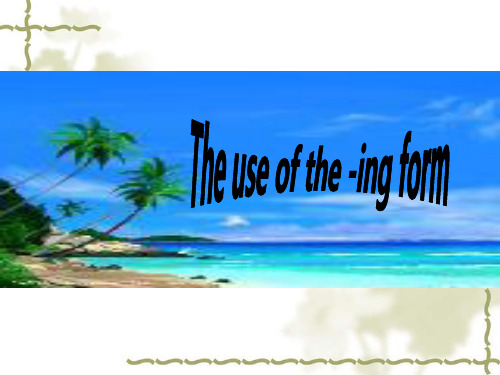
enjoy finish mind miss keep
+to do /doing
hate
love
prefer
remember
regret
try stop begin forget like start
用作宾语
①只能后接动名词作宾语的动词,常见的有 avoid,consider,enjoy,keep,finish, suggest,dislike,delay,escape,cannot help,imagine,mind,miss,practise, cannot stand等。如:
There is no sense (in ) __c_ri_t_ic_i_s_i_n_g_______ him. (criticise)
There is no point (in)_e_x_p__la_i_n_i_n_g___ the reason now. (explain)
There is no need _to__t_e_ll___her.(tell)
-ing form used as the subject(主语)
Practise Ex.2
rewrite the sentences using ---ing form p13
1. Helping people in need of help is nice. 2. Growing super hybrid rice is not easy. 3. Learning more about farming is not difficult. 4. In the countryside doing research is not as easy as in the city. 5. Getting rid of hunger is very important in some African countries. 6. Explaining this again is important or we will confuse the students.
+to do /doing
hate
love
prefer
remember
regret
try stop begin forget like start
用作宾语
①只能后接动名词作宾语的动词,常见的有 avoid,consider,enjoy,keep,finish, suggest,dislike,delay,escape,cannot help,imagine,mind,miss,practise, cannot stand等。如:
There is no sense (in ) __c_ri_t_ic_i_s_i_n_g_______ him. (criticise)
There is no point (in)_e_x_p__la_i_n_i_n_g___ the reason now. (explain)
There is no need _to__t_e_ll___her.(tell)
-ing form used as the subject(主语)
Practise Ex.2
rewrite the sentences using ---ing form p13
1. Helping people in need of help is nice. 2. Growing super hybrid rice is not easy. 3. Learning more about farming is not difficult. 4. In the countryside doing research is not as easy as in the city. 5. Getting rid of hunger is very important in some African countries. 6. Explaining this again is important or we will confuse the students.
精选高中 4Module 2Grammar(共29张PPT) - 副本公开PPT课件
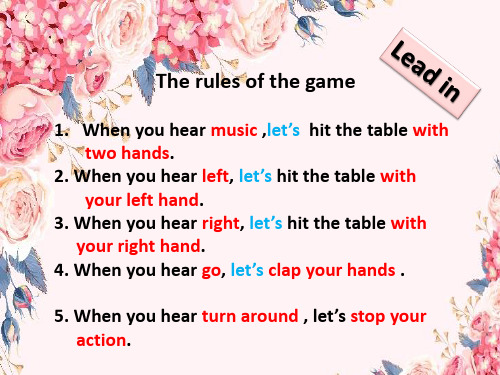
2012 重庆5 Before you give up your job, _B__ how your
family would feel about your decision. A consider B consider C to consider D considered
6 只要你一抬手那么计程车马上就到你面前
conclude
祈使句真神奇, 常常代表小情绪。 命令、要求和建议, 还有劝告和祝愿。 动词原形来开头, 没有主语有呼语。 它能让你更得体, 语言运用显实力。
第二节:书面表达(满分25分) 假设你是晨光中学的机器人兴趣小组组长李津,你的美国朋友Chris就读于天津某国际学 校,他曾在机器人技能竞赛中获奖。你打算邀请他加入你的团队,参加即将于7月底在 天津举行的世界青少学机器人技能竞赛。请根据以下提示代表兴趣小组给他写一封电子 邮件。
3. Be able to express yourself properly with the imperative sentence in a real situation
What you have known
imperative
definition
feelings moods
structures
Study harder ,and you will catch up with the others in your class. 劝告、建议
Get up early, or you can’t catch the school
bus.
警告
祈使句+ and/ or+ 陈述语气
Kate, ____ your homework here tomorrow. 呼语 covative
family would feel about your decision. A consider B consider C to consider D considered
6 只要你一抬手那么计程车马上就到你面前
conclude
祈使句真神奇, 常常代表小情绪。 命令、要求和建议, 还有劝告和祝愿。 动词原形来开头, 没有主语有呼语。 它能让你更得体, 语言运用显实力。
第二节:书面表达(满分25分) 假设你是晨光中学的机器人兴趣小组组长李津,你的美国朋友Chris就读于天津某国际学 校,他曾在机器人技能竞赛中获奖。你打算邀请他加入你的团队,参加即将于7月底在 天津举行的世界青少学机器人技能竞赛。请根据以下提示代表兴趣小组给他写一封电子 邮件。
3. Be able to express yourself properly with the imperative sentence in a real situation
What you have known
imperative
definition
feelings moods
structures
Study harder ,and you will catch up with the others in your class. 劝告、建议
Get up early, or you can’t catch the school
bus.
警告
祈使句+ and/ or+ 陈述语气
Kate, ____ your homework here tomorrow. 呼语 covative
人教高中英语必修4Unit2Grammar(共23张PPT)
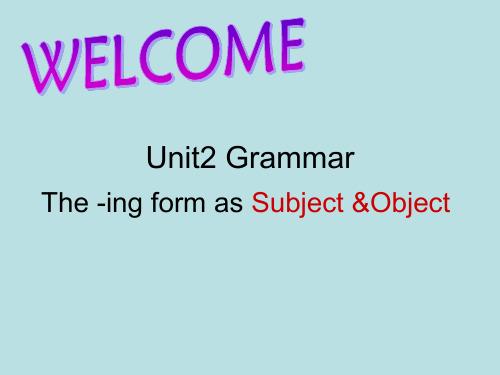
homework
• 1.Frist ,Watch the video Barnyard.
about a cow named Oddis. Second , complete the passage. • 2.write a passage about a great but simple person you admire.
3.在春天植树是值得的。 It is worth/worthwhile planting trees in spring. 4.和你在一起学习是有趣的。
It is pleasant/fun studying with you.
I like wworkiinngg here.
V-ing used as object
tea--c--h---e--r----is my dream. P---l-a-h-y-o--ib-n--bg--y- v.olleyball is my I menyjofyrep-e-l-a---ty--ii-mn---ge--.-volleyball in I love my students so much
games
surf the Internet
eat
1.It seems that the cat is interested in_______.
2.The cat is fond of ___________. 3.The cat doesn’t care about________.
1.The dog dreams of __________.
V-ing used as subject
Teaching English makes me happy. So,being a good English teacher is my
精选高中 4Module 2Grammar(共32张PPT)公开PPT课件

• 4. _____kind and helpful to the people around us, and we will make the world a nicer place.
• A.Be B.Being C.To be D.Been • 5. ----Let’s ____ volleyball. • ---- That sounds good • A. play B. to play C. plays D. to plays • 6. It is raining. _______ the raincoat with you when you go out. • A. Bring B. Take C. Put D. Took
NO talking!是警示,祈使用法要牢记!
PART 03
Exercises
• 1. It's an important meeting. _____D_o_n__'t__b_e_____ (not, be) late. • 2. ___D_o_n_'t__m__a_ke____ (not, make) any noise! Your mother is sleeping. • 3. ___D_o_n_'t__s_p_e_a_k____ (not, speak) with your mouth full of food and
• A. Sending B. To send C. Sends D. Send • 2.______ to smile at your life when you are in trouble, and
you will soon be happy again. • A. Try B. To try C.Trying D.Tried • 3. —John, ______ up now or we'll be late for the bus. • —All right. I'll be quick. • A.gets B. get C.to get D.getting
教科版Book 4 Unit 2 Grammar (11PPT).ppt
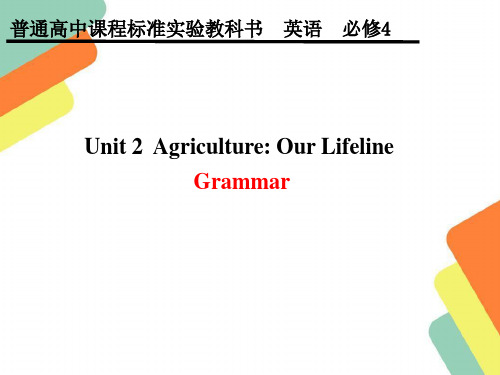
No matter how awful the weather might be, he would work in the field.
(3) Tell me something about the countryside. You once lived there for ten years. (since)
Tell me something about the countryside since you once lived there for ten years.
(4) My uncle came to visit us. My uncle brought some sweets for me. (every time)
Note: Some words ending in -f or -fe add -s. Example: chief – chiefs, cliffs – cliffs, roof – roofs, giraffe – giraffes.
(3) mouse → mice louse (虱子) → __li_c_e__ (4) ox → oxen child → child_r_e_n (5) foot →feet tooth →__t_e_et_h_ goose →__g_e_e_s_e_
Every time my uncle came to visit us, he brought some sweets for me.
(5) He looks in high spirits today. He might have sold his cows at a high price. (as if)
studio – studios radio – radios zoo – zoos
(3) Tell me something about the countryside. You once lived there for ten years. (since)
Tell me something about the countryside since you once lived there for ten years.
(4) My uncle came to visit us. My uncle brought some sweets for me. (every time)
Note: Some words ending in -f or -fe add -s. Example: chief – chiefs, cliffs – cliffs, roof – roofs, giraffe – giraffes.
(3) mouse → mice louse (虱子) → __li_c_e__ (4) ox → oxen child → child_r_e_n (5) foot →feet tooth →__t_e_et_h_ goose →__g_e_e_s_e_
Every time my uncle came to visit us, he brought some sweets for me.
(5) He looks in high spirits today. He might have sold his cows at a high price. (as if)
studio – studios radio – radios zoo – zoos
人教高中英语必修4Unit2Grammar(共19张PPT)
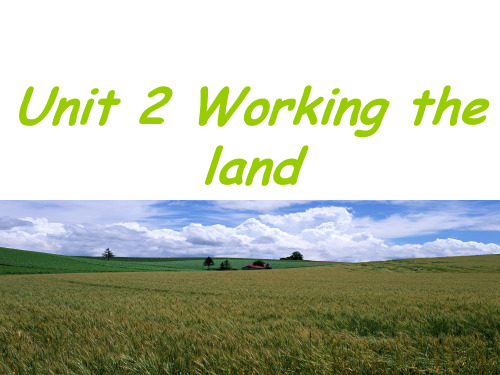
everyone thought he had cheated a lot of
money of a rich lady. 2) 这本书的发行量已经超过了10万本。 _T_h_e__ _c_i_r_c_u_la_t_io_n__ (发行量) of the book is
more than 100,000 copies.
sunburn vt. & vi. & n. 日晒;日灼;晒黑 sunburnt adj. 晒黑的 sunbathe vi. 日光沐
1) The cream (乳霜)_p_r_o_t_e_c_ts__y_o_u_r_s_k_i_n_f_r_o_m__s_u_n_bur (保护你的皮肤不被太阳晒伤) 2) His ___s_u_n_b_u_r_n_t_f_a_c_e_________ (晒黑的脸) suggests that he is a farmer.
_____t_o__t_e_l_l____ (tell) her about this.
3. This special strain of rice makes it possible to produce one-third more of the crop in the same fields. make it +宾语补足语+动词不定式, it 做形 式宾语,动词不定式是真正的宾语。 it做形式宾语, 通常和下列动词连用:
[注意] : rid还可以作名词, 构成短语get rid of, 意为“摆脱掉、除掉、处理掉”。 1)对他来说改掉坏习惯并不容易。 It is not easy for him to get rid of the
bad habit. = It is hard for him to _r_id_ _h_im__s_e_lf _o_f the bad habit.
money of a rich lady. 2) 这本书的发行量已经超过了10万本。 _T_h_e__ _c_i_r_c_u_la_t_io_n__ (发行量) of the book is
more than 100,000 copies.
sunburn vt. & vi. & n. 日晒;日灼;晒黑 sunburnt adj. 晒黑的 sunbathe vi. 日光沐
1) The cream (乳霜)_p_r_o_t_e_c_ts__y_o_u_r_s_k_i_n_f_r_o_m__s_u_n_bur (保护你的皮肤不被太阳晒伤) 2) His ___s_u_n_b_u_r_n_t_f_a_c_e_________ (晒黑的脸) suggests that he is a farmer.
_____t_o__t_e_l_l____ (tell) her about this.
3. This special strain of rice makes it possible to produce one-third more of the crop in the same fields. make it +宾语补足语+动词不定式, it 做形 式宾语,动词不定式是真正的宾语。 it做形式宾语, 通常和下列动词连用:
[注意] : rid还可以作名词, 构成短语get rid of, 意为“摆脱掉、除掉、处理掉”。 1)对他来说改掉坏习惯并不容易。 It is not easy for him to get rid of the
bad habit. = It is hard for him to _r_id_ _h_im__s_e_lf _o_f the bad habit.
教科版Book4Unit2Grammar

教科版 Book4Unit2Grammar
2020/9/21
Grammar from the text
Combine each pair of sentences. (1) He owns some fruit trees. These trees
produce a lot of fruit each year. (that) He owns some fruit trees that produce a lot of fruit each year.
The following 13 nouns ending in -f or -fe in the singular are spelt with -ves in the plural. calf; elf; half; knife; leaf; life; loaf; self; sheaf; shelf; thief; wife; wolf.
However, some plural nouns do not always end in “-s”. Do the following exercises and find out the rules.
(1)matches potato_e_s glass_e_s box_e_s quiz_e_s
epoch – epochs
Note: foreign or abbreviated words ending in -o add -s only.
Example: piano – pianos solo – solos zero – zeros photo – photos
Nouns ending in –o, preceded by a vowel letter take –s form. Example: bamboo – bamboos
2020/9/21
Grammar from the text
Combine each pair of sentences. (1) He owns some fruit trees. These trees
produce a lot of fruit each year. (that) He owns some fruit trees that produce a lot of fruit each year.
The following 13 nouns ending in -f or -fe in the singular are spelt with -ves in the plural. calf; elf; half; knife; leaf; life; loaf; self; sheaf; shelf; thief; wife; wolf.
However, some plural nouns do not always end in “-s”. Do the following exercises and find out the rules.
(1)matches potato_e_s glass_e_s box_e_s quiz_e_s
epoch – epochs
Note: foreign or abbreviated words ending in -o add -s only.
Example: piano – pianos solo – solos zero – zeros photo – photos
Nouns ending in –o, preceded by a vowel letter take –s form. Example: bamboo – bamboos
人教高中英语必修4Unit2Grammar(共23张PPT)

1)我不能避免犯错误。
I can’t avoid making mistakes.
2)人们情不自禁的笑了。
People couldn’t help laughing
2. 既可接-ing和to do作宾语的动词, 常见的有: begin, start, continue, like, love, hate ,prefer, mean, forget,remember, regret 等。
A. 在 like, love, hate, prefer等动词之后, 用-ing或不定式意义上没有什么不同, 只是侧重 点有些不同, ing表示泛指的动作, to do表示具体的一次性动作。例如
我喜欢读书
I like reading.(经常性、习惯性的动作)
I like to read.(具体的一次动作)
1. No one enjoys _______ at.
A. laughing
B. to laugh
C. being laughed
D. to be laughed
2. — Let’s have a rest.
— Not now. I don’t want to stop
___ yet.
A. study
1. If you can keep _r_e_a_d_i_n_g_(read) English
newspapers, your English will be improved.
2. Excuse me for
coming
________
(come)
late.
3. I hate ___t_e_ll_i_n_g_/t_o_t_e_l_l ___(tell) lies!
I can’t avoid making mistakes.
2)人们情不自禁的笑了。
People couldn’t help laughing
2. 既可接-ing和to do作宾语的动词, 常见的有: begin, start, continue, like, love, hate ,prefer, mean, forget,remember, regret 等。
A. 在 like, love, hate, prefer等动词之后, 用-ing或不定式意义上没有什么不同, 只是侧重 点有些不同, ing表示泛指的动作, to do表示具体的一次性动作。例如
我喜欢读书
I like reading.(经常性、习惯性的动作)
I like to read.(具体的一次动作)
1. No one enjoys _______ at.
A. laughing
B. to laugh
C. being laughed
D. to be laughed
2. — Let’s have a rest.
— Not now. I don’t want to stop
___ yet.
A. study
1. If you can keep _r_e_a_d_i_n_g_(read) English
newspapers, your English will be improved.
2. Excuse me for
coming
________
(come)
late.
3. I hate ___t_e_ll_i_n_g_/t_o_t_e_l_l ___(tell) lies!
人教高中英语必修4Unit2Grammar(共24张PPT)
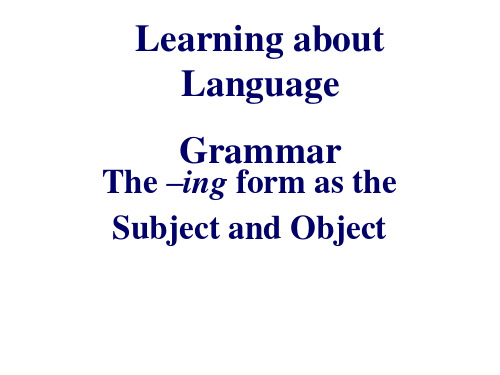
After being away for several years, it is a strange experience to return to the hometown.
B. 动词+介词+动名词, 如: 我坚持为这次出行带足需要的食物。 I insist on taking proper food for this trip. 同学们脸上没有笑容, 相反都做了怪脸。
做……是浪费时间的
• It is/was no good/use doing 做……是没用处的
• It is/was hardly/scarcely worth doing 做……不值得
• It is/was worth/worthwhile doing 做……是值得的
• There is no doing... 无法……; 不允许……
D. 在try, mean 之后, 意义各不相同, 如 try to do (设法), try doing (试试), mean to do (打算, 有意要做), mean doing (意思是, 意味着)。 如: 我们必须设法及时把一切搞好。
We must try to get everything done in time.
做这件傻事毫无意义。 There is no point doing such a silly thing.
注意: There is no need to do sth 干……没必要, 在此句式中to do 不可换为doing. 没有必要告诉她。 There is no need to tell her. 提示: 当动名词用作主语时, 其逻辑主语由 形容词性物主代词和名词所有格构成。 我姐姐病了, 使我很担心。 My sister’s being ill made me worried. 你正确未必就意味着我错了。 Your being right doesn’t necessarily mean my
B. 动词+介词+动名词, 如: 我坚持为这次出行带足需要的食物。 I insist on taking proper food for this trip. 同学们脸上没有笑容, 相反都做了怪脸。
做……是浪费时间的
• It is/was no good/use doing 做……是没用处的
• It is/was hardly/scarcely worth doing 做……不值得
• It is/was worth/worthwhile doing 做……是值得的
• There is no doing... 无法……; 不允许……
D. 在try, mean 之后, 意义各不相同, 如 try to do (设法), try doing (试试), mean to do (打算, 有意要做), mean doing (意思是, 意味着)。 如: 我们必须设法及时把一切搞好。
We must try to get everything done in time.
做这件傻事毫无意义。 There is no point doing such a silly thing.
注意: There is no need to do sth 干……没必要, 在此句式中to do 不可换为doing. 没有必要告诉她。 There is no need to tell her. 提示: 当动名词用作主语时, 其逻辑主语由 形容词性物主代词和名词所有格构成。 我姐姐病了, 使我很担心。 My sister’s being ill made me worried. 你正确未必就意味着我错了。 Your being right doesn’t necessarily mean my
人教高中英语必修4unit2 grammar (共21张ppt)
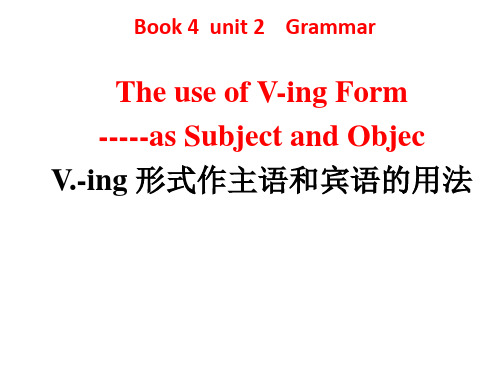
A. to write and listen
B. writing and listening
C. D.
twoDrwitirnitgeaannddtloisltiestneinng
8. Remember __________ thCe newspaper when you have finished it.
C
C. spending D. to spend
5. I like __________ very much, but I don’t like _________ this mornin g.
A. B.
swimming, to swim, to
tsAowsimwim
C. swimming, swimming
Self-work & co-work (自主探究、合作学习 1)
概念检测:
V-ing形式具有
的动特词点,但在句子中起着 、
的作
用,名充词当 形、容词、 、 、宾语补足语和状语的作用 。
主语 宾语 表语 定语
本节课我们学习 V-ing 形式充当 和 的用法。
主语 宾语
Self-work & co-work 2 (自主探究、合作学习2)
Task 2 Have a try in class
Choose the best answer
1 They are considering __C__ before the
prices go up。 A. of buying the house B. with buying the house C. buying the house D. to buy the house
一、V–ing 作主语
教科版Book 4 Unit 3 Grammar (29PPT)精品课件

a chair, newspaper, Bush, Hong Kong, clothes, nature, Asia, China, the English Channel, Olympics, God, Christmas, Monday, January, the Great Wall, United Nations, streets, China Daily
(1)Sweet potatoes are widely planted as an annual in the tropics. In the tropics sweet potatoes serve as a major food source. (2)The tomato is a widely cultivated South American plant. The tomato has edible, fleshy, and usually red fruit. (3)The Chinese gooseberry is called kiwifruit by New Zealanders. New Zealanders made kiwifruit famous in the world.
Step-by-step grammar: think!
Give examples to illustrate the features of proper nouns.
1) Proper nouns are names of specific people (Bush), places( Hong Kong), countries( China), months( January), days( Monday), holidays( Christmas), newspapers( China Daily), and so forth.
(1)Sweet potatoes are widely planted as an annual in the tropics. In the tropics sweet potatoes serve as a major food source. (2)The tomato is a widely cultivated South American plant. The tomato has edible, fleshy, and usually red fruit. (3)The Chinese gooseberry is called kiwifruit by New Zealanders. New Zealanders made kiwifruit famous in the world.
Step-by-step grammar: think!
Give examples to illustrate the features of proper nouns.
1) Proper nouns are names of specific people (Bush), places( Hong Kong), countries( China), months( January), days( Monday), holidays( Christmas), newspapers( China Daily), and so forth.
人教新课标高中英语必修四课件:Unit2grammar(共25张PPT)
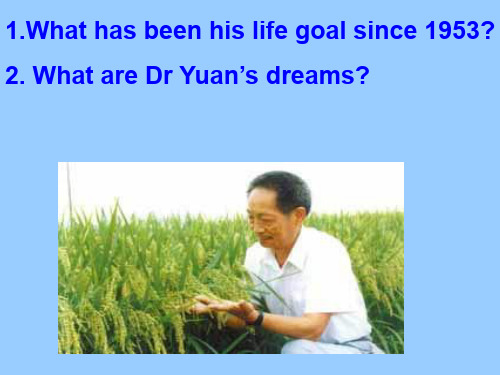
• 3. Learning more about farming is not difficult.
• 4. Doing research in the countryside is not as easy as in the city.
• 5. Getting rid of hunger is very important for some African countries.
like…sleeping in the sun. Cats enjoy…eating fish.
Describe the picture with V-ing used as object (1)
1.It seems that the cat enjoys _d_r_i_n_k_in__g_b_e_e_r_. very much.
• 6. Explaining this again is important or we will confuse the students.
我改变不了环境,但我可以改变自己 我不能控制他人,但我可以掌握自己
I hope to change the environment, but I fail to change the environment. So I decide to change myself.
2. What are his hobbies?
He enjoys listening to violin music, playing mah-jong, swimming and reading.
Since then, finding ways to grow more rice has been his life goal. subject
• 4. Doing research in the countryside is not as easy as in the city.
• 5. Getting rid of hunger is very important for some African countries.
like…sleeping in the sun. Cats enjoy…eating fish.
Describe the picture with V-ing used as object (1)
1.It seems that the cat enjoys _d_r_i_n_k_in__g_b_e_e_r_. very much.
• 6. Explaining this again is important or we will confuse the students.
我改变不了环境,但我可以改变自己 我不能控制他人,但我可以掌握自己
I hope to change the environment, but I fail to change the environment. So I decide to change myself.
2. What are his hobbies?
He enjoys listening to violin music, playing mah-jong, swimming and reading.
Since then, finding ways to grow more rice has been his life goal. subject
外研 高中英语必修4Module 2Grammar(共32张PPT)

Book 4 Module 2 Grammar
Imperative Sentence
CONTENTS
Part
01
Part
02
Part
03
Part
04
Part
05
Definition of Imperative Sentence Structure of Imperative Sentence Exercises Summary Homework
B. no wasting
C. not to waste
D. no waste
4. —__D__ higher, and you will see the house. — OK.
A. If you stand
B. To stand
C. When you stand D. Stand
5. ___D__ forget to write to me when you _____ get there next
• A. Sending B. To send C. Sends D. Send • 2.______ to smile at your life when you are in trouble, and
you will soon be happy again. • A. Try B. To try C.Trying D.Tried • 3. —John, ______ up now or we'll be late for the bus. • —All right. I'll be quick. • A.gets B. get C.to get D.getting
Read and observe
英语Unit2Grammar课件(新人教版必修4)
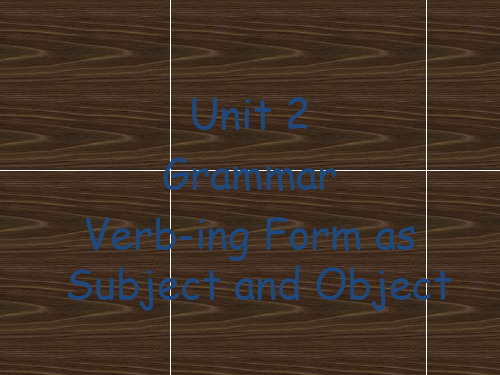
…is his/her job every day. He/She enjoys … He/She is interested in … He/She dreams of … He/She hates … … makes him/her happy/sad. He/She cares about …
knew nothing about it.
Can you say something about them?
He/She devotes … to … He/She is concerned about …
Let’s talk about our friends! Remember to use Verb-ing as much as possible.
• 1. Helping people in need of help is nice. • 2. Growing super hybrid rice is not easy. • 3. Learning more about farming is not difficult. • 4. Doing research in the countryside is not as
Do some research on verbs following the
questions:
*Which verbs should be followed by verbing form as object?
*Which verbs should be followed by “to do ”?
I insisptroonn./yno.u+Vseerebin-ginhgim
yooufrf now.
Mary/Mary’s
knew nothing about it.
Can you say something about them?
He/She devotes … to … He/She is concerned about …
Let’s talk about our friends! Remember to use Verb-ing as much as possible.
• 1. Helping people in need of help is nice. • 2. Growing super hybrid rice is not easy. • 3. Learning more about farming is not difficult. • 4. Doing research in the countryside is not as
Do some research on verbs following the
questions:
*Which verbs should be followed by verbing form as object?
*Which verbs should be followed by “to do ”?
I insisptroonn./yno.u+Vseerebin-ginhgim
yooufrf now.
Mary/Mary’s
精品最新 教科版Book 4 Unit 2 Grammar (11PPT)
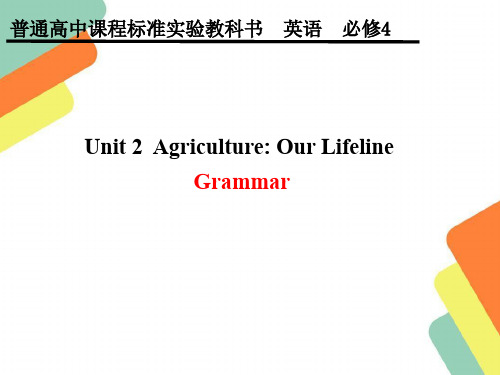
(3) & (5) indicate Irregular plurals with internal vowel change.
(4) Indicates that some irregular plurals are formed by changing the ending of the noun.
Note: Some words ending in -f or -fe add -s. Example: chief – chiefs, cliffs – cliffs, roof – roofs, giraffe – giraffes.
(3) mouse → mice louse (虱子) → __li_c_e__ (4) ox → oxen child → child_r_e_n (5) foot →feet tooth →__t_e_et_h_ goose →__g_e_e_s_e_
普通高中课程标准实验教科书 英语 必修4
Unit 2 Agriculture: Our Lifeline Grammar
Grammar from the text
Combine each pair of sentences. (1) He owns some fruit trees. These trees
No matter how awful the weather might be, he would work in the field.
(3) Tell me something about the countryside. You once lived there for ten years. (since)
studio – studios radio – radios zoo – zoos
(4) Indicates that some irregular plurals are formed by changing the ending of the noun.
Note: Some words ending in -f or -fe add -s. Example: chief – chiefs, cliffs – cliffs, roof – roofs, giraffe – giraffes.
(3) mouse → mice louse (虱子) → __li_c_e__ (4) ox → oxen child → child_r_e_n (5) foot →feet tooth →__t_e_et_h_ goose →__g_e_e_s_e_
普通高中课程标准实验教科书 英语 必修4
Unit 2 Agriculture: Our Lifeline Grammar
Grammar from the text
Combine each pair of sentences. (1) He owns some fruit trees. These trees
No matter how awful the weather might be, he would work in the field.
(3) Tell me something about the countryside. You once lived there for ten years. (since)
studio – studios radio – radios zoo – zoos
- 1、下载文档前请自行甄别文档内容的完整性,平台不提供额外的编辑、内容补充、找答案等附加服务。
- 2、"仅部分预览"的文档,不可在线预览部分如存在完整性等问题,可反馈申请退款(可完整预览的文档不适用该条件!)。
- 3、如文档侵犯您的权益,请联系客服反馈,我们会尽快为您处理(人工客服工作时间:9:00-18:30)。
He looks in high spirits today as if he sold his cows at a high price.
Step-by-step grammar
countable nouns and their plural forms
The plural form of a noun is usually made by adding “-s” to the singular. Examples: book- books ; film – films
Every time my uncle came to visit us, he brought some sweets for me.
(5) He looks in hve sold his cows at a high price. (as if)
普通高中课程标准实验教科书 英语 必修4
Unit 2 Agriculture: Our Lifeline Grammar
Grammar from the text
Combine each pair of sentences. (1) He owns some fruit trees. These trees
Tell me something about the countryside since you once lived there for ten years.
(4) My uncle came to visit us. My uncle brought some sweets for me. (every time)
(6) fish →fish sheep →__s_h_e_e_p_ deer →__d_e_e_r__
The plural of some nouns is the same as the singular. salmon → salmon reindeer → reindeer
(7) phenomenon →phenomena datum →___d_a_ta__ crisis →__c_r_is_e_s_ analysis →_a_n_a_l_y_s_es
produce a lot of fruit each year. (that) He owns some fruit trees that produce a lot of fruit each year.
(2) The weather might be awful. He would work in the field. (no matter how)
studio – studios radio – radios zoo – zoos
Some nouns ending in –o can add –s or–es (mosquito, cargo, motto).
(2) half → halves wife → _w_i_v_e_s_ wolf → _w_o_l_v_e_s leaf → _le_a_v_e_s_
However, some plural nouns do not always end in “-s”. Do the following exercises and find out the rules.
(1)matches potato_e_s glass_e_s box_e_s quiz_e_s
Nouns ending in ch, sh, o, s, x, or z add -es.
Note: If the -ch ending is pronounced with a ‘k’ sound, we add -s rather than –es. Example: stomach – stomachs
epoch – epochs
Note: foreign or abbreviated words ending in -o add -s only.
Example: piano – pianos solo – solos zero – zeros photo – photos
Nouns ending in –o, preceded by a vowel letter take –s form. Example: bamboo – bamboos
Note: Some words ending in -f or -fe add -s. Example: chief – chiefs, cliffs – cliffs, roof – roofs, giraffe – giraffes.
(3) mouse → mice louse (虱子) → __li_c_e__ (4) ox → oxen child → child_r_e_n (5) foot →feet tooth →__t_e_et_h_ goose →__g_e_e_s_e_
The following 13 nouns ending in -f or -fe in the singular are spelt with -ves in the plural. calf; elf; half; knife; leaf; life; loaf; self; sheaf; shelf; thief; wife; wolf.
(3) & (5) indicate Irregular plurals with internal vowel change.
(4) Indicates that some irregular plurals are formed by changing the ending of the noun.
No matter how awful the weather might be, he would work in the field.
(3) Tell me something about the countryside. You once lived there for ten years. (since)
Step-by-step grammar
countable nouns and their plural forms
The plural form of a noun is usually made by adding “-s” to the singular. Examples: book- books ; film – films
Every time my uncle came to visit us, he brought some sweets for me.
(5) He looks in hve sold his cows at a high price. (as if)
普通高中课程标准实验教科书 英语 必修4
Unit 2 Agriculture: Our Lifeline Grammar
Grammar from the text
Combine each pair of sentences. (1) He owns some fruit trees. These trees
Tell me something about the countryside since you once lived there for ten years.
(4) My uncle came to visit us. My uncle brought some sweets for me. (every time)
(6) fish →fish sheep →__s_h_e_e_p_ deer →__d_e_e_r__
The plural of some nouns is the same as the singular. salmon → salmon reindeer → reindeer
(7) phenomenon →phenomena datum →___d_a_ta__ crisis →__c_r_is_e_s_ analysis →_a_n_a_l_y_s_es
produce a lot of fruit each year. (that) He owns some fruit trees that produce a lot of fruit each year.
(2) The weather might be awful. He would work in the field. (no matter how)
studio – studios radio – radios zoo – zoos
Some nouns ending in –o can add –s or–es (mosquito, cargo, motto).
(2) half → halves wife → _w_i_v_e_s_ wolf → _w_o_l_v_e_s leaf → _le_a_v_e_s_
However, some plural nouns do not always end in “-s”. Do the following exercises and find out the rules.
(1)matches potato_e_s glass_e_s box_e_s quiz_e_s
Nouns ending in ch, sh, o, s, x, or z add -es.
Note: If the -ch ending is pronounced with a ‘k’ sound, we add -s rather than –es. Example: stomach – stomachs
epoch – epochs
Note: foreign or abbreviated words ending in -o add -s only.
Example: piano – pianos solo – solos zero – zeros photo – photos
Nouns ending in –o, preceded by a vowel letter take –s form. Example: bamboo – bamboos
Note: Some words ending in -f or -fe add -s. Example: chief – chiefs, cliffs – cliffs, roof – roofs, giraffe – giraffes.
(3) mouse → mice louse (虱子) → __li_c_e__ (4) ox → oxen child → child_r_e_n (5) foot →feet tooth →__t_e_et_h_ goose →__g_e_e_s_e_
The following 13 nouns ending in -f or -fe in the singular are spelt with -ves in the plural. calf; elf; half; knife; leaf; life; loaf; self; sheaf; shelf; thief; wife; wolf.
(3) & (5) indicate Irregular plurals with internal vowel change.
(4) Indicates that some irregular plurals are formed by changing the ending of the noun.
No matter how awful the weather might be, he would work in the field.
(3) Tell me something about the countryside. You once lived there for ten years. (since)
